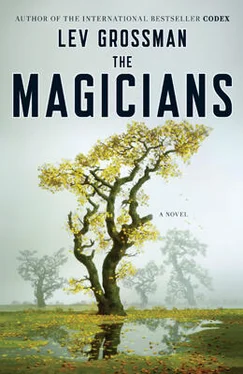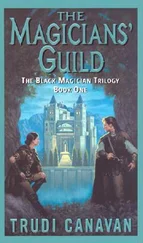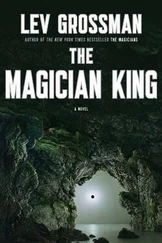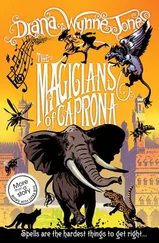Quentin’s feet were killing him breaking in his brand-new hiking boots. He’d never dried off the foot he’d soaked in the stream before, and now it felt hot and blistered and mildewy. He imagined painful fungal spores taking root and flourishing in the warm wetness between his toes. He wondered how far they’d walked. It had been about thirty hours since he’d slept.
Both Penny and Anaïs were adamantly against turning back. What if the Chatwins had turned back? Penny said. They were part of a story now. Had anybody actually ever read a story? This was the hump, the hard part, the part they’d be rewarded for later. You just had to get through it. And not to go on, but who are the good guys here? We are the good guys. And the good guys always survive.
“Wake up!” Alice said. “This isn’t a story! It’s just one fucking thing after another! Somebody could have died back there!” She obviously meant Quentin but didn’t want to say his name.
“Maybe Helen Chatwin was right,” Richard said. “Maybe we’re not supposed to be here.”
“You don’t get it, do you?” Janet stared them down. “It’s supposed to be confusing at the beginning. The situation will get explained in time . We just have to keep moving. Keep picking up clues. If we leave now and come back it’ll be like five hundred years from now and we’ll have to start all over again.”
Quentin looked from one to the other of them: Alice smart and skeptical, Janet all action and thoughtless exuberance. He turned to Anaïs to ask her how far she thought they’d walked, on the vague theory that a European person might have a more accurate sense of these things than a bunch of Americans, when he realized he was the only one of the party who wasn’t staring off into the forest to their right. Passing them through the darkening trees, on a parallel course, was the strangest thing Quentin had ever seen.
It was a birch tree, striding along through the forest. Its trunk forked a meter from the ground to form two legs on which it took stiff, deliberate steps. It was so thin that it was hard to keep track of in the half-light, but its white bark stood out from the dark trunks around it. Its thin upper branches whipped and snapped against the trees it pushed past. It looked more like a machine or a marionette than a person. Quentin wondered how it kept its balance.
“Holy crap,” said Josh.
Without speaking they began to trail after it. The tree didn’t hail them, but for a moment its crown of branches twisted in their direction, as if it were glancing over a shoulder it didn’t have. In the stillness they could actually hear it creaking as it foraged along, like a rocking chair. Quentin got the distinct impression it was ignoring them.
After the first five minutes of magical wonderment passed it began to be socially awkward, blatantly following the tree-spirit-thing like this, but it didn’t seem to want to acknowledge them, and they weren’t about to let it go. As a group they clung to it. Maybe this thing was going to put them in the picture, Quentin thought. If it didn’t turn around and beat them all to death with its branches.
Janet kept a close eye on Penny and shushed him whenever he looked like he might be about to say something.
“Let it make the first move,” she whispered.
“Freak show,” Josh said. “What is that thing?”
“It’s a dryad, idiot.”
“I thought those were girl-trees.”
“They’re supposed to be sexy girl-trees,” Josh said plaintively.
“And I thought dryads were oaks,” Alice said. “That’s a birch.”
“What makes you think it’s not a girl-tree?”
“Whatever it is,” Josh said under his breath, “it’s pay dirt. Fuckin’ tree-thing, man. Pay fuckin’ dirt.”
The tree was a fast walker, almost bouncing along on its springy, knee-less legs, to the point where soon they would have to break into a half jog to keep up with it. Just when it looked like they were either going to lose their only promising lead so far or segue into an undignified chase scene, it became obvious where it was heading anyway.
Ten minutes later Quentin was sitting in a booth in a dimly lit bar with a pint of beer on the table in front of him, as yet untasted. Though unexpected, this felt like a good development for him. Bar, booth, beer. This was a situation where he knew how to handle himself, whatever world he was in. If he’d been training for anything since he left Brakebills, it was this.
Identical pints stood in front of the others. It was late afternoon, five thirty or so, Quentin guessed, though how could you know? Were there even twenty-four hours in a day here? Why would there be? Despite Penny’s insistence that the tree had been “leading” them here, it was pretty clear they would have found the inn on their own. It was a dark, low-roofed log cabin with a sign outside featuring two crescent moons; a delicate little clockwork mechanism caused the two moons to revolve around each other when the wind blew. The cabin was backed up against, and appeared almost to emerge from, a low hillock that humped up out of the forest floor.
Cautiously pushing inside, through swinging doors, they discovered what could have passed for a period room in a museum of Colonial America: a long narrow chamber with a bar against one wall. It reminded Quentin of the Historick Olde Innes he’d wandered through when he was visiting his parents in Chesterton.
Only one other booth was occupied, by a family(?) — a tall, white-haired old man; a high-cheekboned woman who might have been in her thirties; and a serious little girl. Obviously locals. They sat perfectly silent and erect, staring balefully at the empty cups and saucers in front of them. The little girl’s hooded eyes expressed a precocious acquaintance with adversity.
The walking birch tree had disappeared, presumably into a back room. The bartender wore a curious old-fashioned uniform, black with many brass buttons, something like what an Edwardian policeman might have worn. He had a narrow, bored face and heavy black five o’clock shadow, and he slowly polished pint glasses with a white cloth in the manner of bartenders since time immemorial. Otherwise the room was empty, except for a large brown bear wearing a waistcoat sitting slumped in a sturdy armchair in one corner. It wasn’t clear whether the bear was conscious or not.
Richard had brought along several dozen small gold cylinders in the hope that they would work as a kind of universal interdimensional currency. The bartender accepted one without comment, weighed it expertly in his palm, and returned a handful of change: four dented, wobbly coins stamped with an assortment of faces and animals. Two of them bore mottos in two different unreadable scripts; the third was a well-worn Mexican peso from the year 1936; the fourth turned out to be a plastic marker from a board game called Sorry. He set about filling pewter tankards.
Josh stared into his dubiously and took a fastidious sniff. He was as fidgety as a third-grader.
“Just drink it!” Quentin hissed irritably. God, people were such losers sometimes. He lifted his own tankard. “Cheers.”
He swished the liquid around in his mouth. It was bitter and carbonated and alcoholic and definitely beer. It filled him with confidence and a renewed sense of purpose. He’d had a scare, but it’s funny how it — and the beer — were now focusing his mind wonderfully. Quentin shared his booth with Richard, Josh, and Anaïs — he had successfully avoided sitting next to either Alice or Janet, or Penny — and they exchanged multiple transverse glances over their foamy pints. They were a long way from where they’d started out that morning.
“I don’t think that bear is stuffed!” Josh whispered excitedly. “I think that’s a real bear!”
Читать дальше












